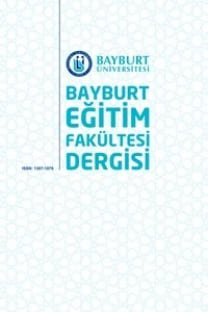Çoklu Zeka Kuramına Dayalı Etkinliklerin Erişi, Tutum ve Öğrenmelerin Kalıcılığına Etkisi
Bu araştırma; bütünleştirilmiş öğretim programı dikkate alınarak hazırlanmış çoklu zeka kuramı etkinliklerin, öğrencilerin erişi düzeylerine, tutumlarına ve öğrenmelerinin kalıcılığına etkisini belirlemek amacıyla yapılmıştır. 2003-2004 öğretim yılı, ikinci döneminde Hayat Bilgisi dersi “Çevremizdeki Canlılar” ünitesi ile sınırlandırılan araştırma; Ankara ili, Mamak İlçesi Coşkun Ertapınar İlköğretim Okulu üçüncü sınıf öğrencileri ile yürütülmüştür. Öntest-sontest kontrol gruplu deneysel desenin kullanıldığı araştırmanın verileri üç seçenekli 20 maddelik çoktan seçmeli başarı testi ile 11 maddelik tutum ölçeğinden elde edilmiştir. Hem Hayat Bilgisi başarı testinin hem de tutum ölçeğinin ön uygulamasında kontrol grubunun çalışmalara daha iyi ortalamayla başladığı saptanmıştır. Gruplar arasında ortaya çıkan bu farklılığı yok edebilmek için başarı ve tutum puanlarının karşılaştırılmasında erişi ortalamaları kullanılmıştır. Ayrıca deney grubunda 21, kontrol grubunda 22 öğrencinin yer alması ve öntest puanlarının istatistiksel olarak kontrol grubu lehine anlamlı bulunması nedeniyle karşılaştırmalar “Mann-Withney U Testi” ile yapılmıştır. Çalışma sonunda deney grubunda uygulanan bütünleştirilmiş öğretim programına göre geliştirilmiş çoklu zeka kuramı etkinliklerinin, kontrol grubunda uygulanan geleneksel eğitim durumlarına göre öğrencilerin erişilerini ve tutumlarını artırmada etkili olduğu belirlenmiştir. Her iki yöntemin öğrenmenin kalıcılığı üzerine benzer etkiyi yaptığı belirlenmesine rağmen, deney grubu ortalamasının hem son testte hem de kalıcılık testlerinde yükselme eğilimi gösterdiği belirlenmiştir.
Anahtar Kelimeler:
Çoklu Zeka Kuramı, Bütünleştirilmiş öğretim programı, Erişi düzeyi, Tutum, Kalıcılık
The Effects of Multiple Intelligence Activities on Achievement, Attitude and Retention of Learning
This study was conducted to identify the effects of multiple intelligence activities based on an integrated curriculum on students’ achievement levels, attitude and retention of learning. Limited to the unit “Living Things around Us” of the Life Studies class taught in the spring term of the 2003-2004 academic year, the study was conducted on third graders from Coşkun Ertapınar Primary School in Mamak, Ankara. It used the pretest-posttest experimental design with a control group and gathered data by using a 20-item multiple choice achievement test with three options and a 11- item attitude scale. In the pilot studies of both the Life Studies achievement test and the attitude scale, the control group started to study with better averages. In order to eliminate this difference between the two groups, achievement meanings were used in the comparison of achievement and attitude scores. As the experimental group included 21 students and the control group 22 students, and the pretest scores were statistically meaningful in favor of the control group, the comparisons were made with the “Mann-Whitney U Test”. The study has shown that, in comparison to the traditional education given in the control group, the multiple intelligences activities based on the integrated curriculum and used in the experimental group increased students’ achievement and attitudes. Although both methods had a similar effect on retention of learning, the experimental group mean score had a tendency to increase in both the post-test and retention tests.
Keywords:
: Multiple Intelligences Theory, Integrated curriculum, Achievement level, Attitude, Retention,
- ISSN: 1307-1076
- Yayın Aralığı: Yılda 4 Sayı
- Başlangıç: 2006
- Yayıncı: BAYBURT UNIVERSITESI
Sayıdaki Diğer Makaleler
Yaşar DEMİR, Sakıp KAHRAMAN, Esra ÖZKAN, Fatma AĞGÜL
Çoklu Zeka Kuramına Dayalı Etkinliklerin Erişi, Tutum ve Öğrenmelerin Kalıcılığına Etkisi
Özcan DEMİREL, Kenan DEMİR, Canan Demirhan İŞCAN, İbrahim TUNCEL, Cem KARACAOĞLU
Ümit ŞİMŞEK, Kemal DOYMUŞ, Ataman KARAÇÖP
İlköğretim Matematik Öğretmeni Adaylarının Kümeler Konusundaki Kavramsal Bilgi Düzeyleri
